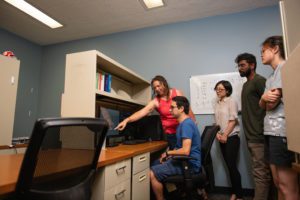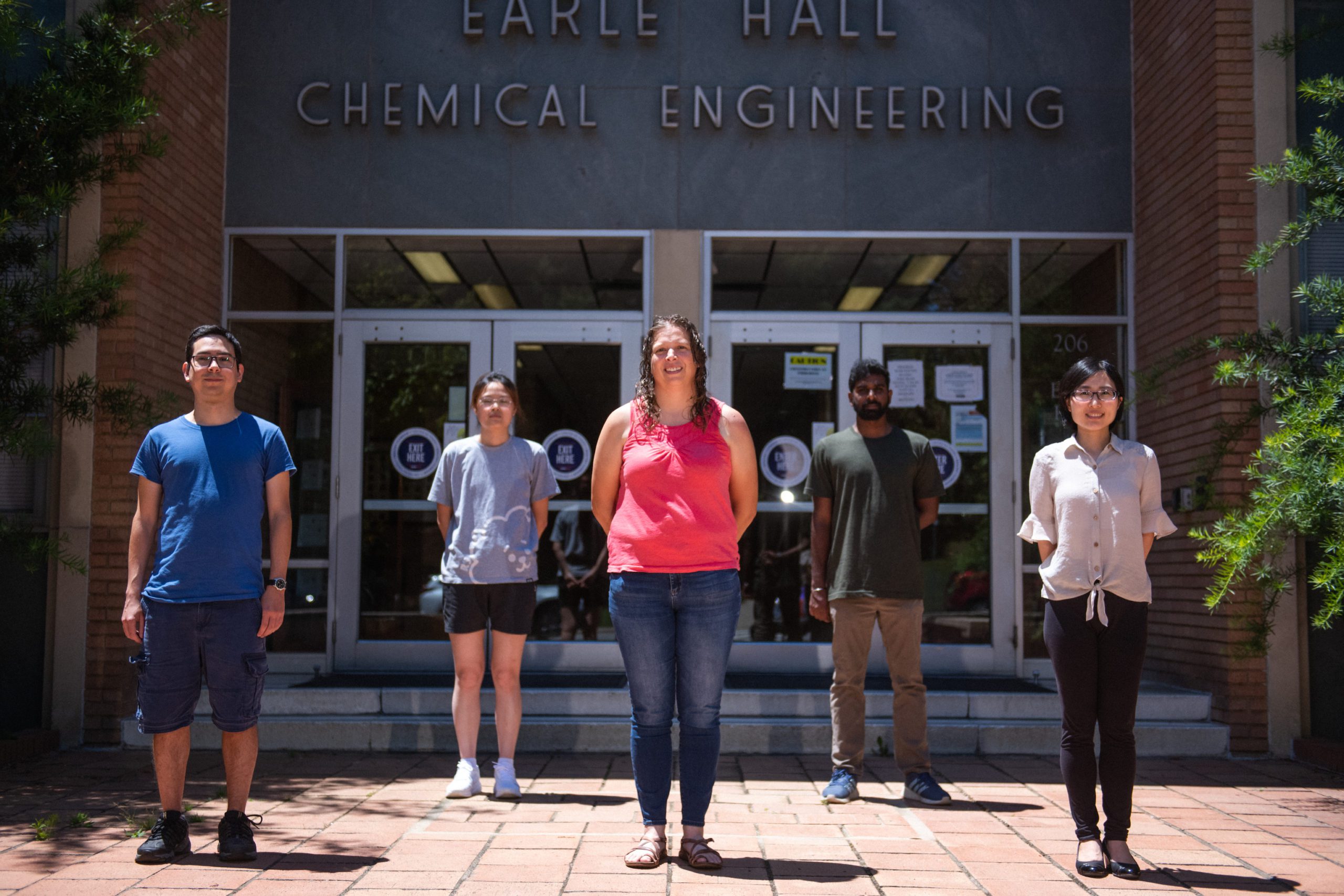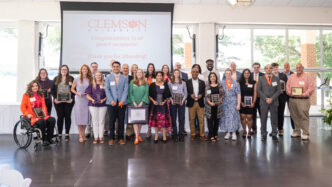When COVID-19 swept the globe, Sachi Hilliard cancelled plans to visit family in Japan and began hunting for a way to use her time wisely while quarantining in her Los Angeles apartment.
Rachel Getman of Clemson University helped save the summer. Hilliard was among 11 interns to go to work in Getman’s lab after watching other plans fall apart because of the virus.
“It was like a lifesaver,” Hilliard said. “I was able to remain connected to people, and I got to learn a whole new field of chemistry.”

Getman, the Murdoch Family Endowed Professor of Chemical and Biomolecular Engineering, was in a position to help so many interns because all the research her team conducts is computational. Research can be done anywhere there is an internet connection.
It has been an extraordinary time in more ways than one for Getman and her students since the pandemic began. The lab hosted about five times as many interns as usual in summer 2020, Getman was appointed to the Murdoch professorship and two of the lab’s members won awards recognizing their excellence.
David Bruce, chair of the Department of Chemical and Biomolecular Engineering, said the lab’s success underscores that Getman practices what she preaches.
“Dr. Getman not only conducts nationally prominent research, she goes above and beyond to mentor high school, undergraduate and graduate students,” he said. “The laudatory reviews she receives from her students are well-deserved. Dr. Getman has played a leading role in ensuring that the department and the college come out of COVID-19 stronger.”
The research that Getman and her students conduct helps lay the groundwork to create more efficient, more effective and less expensive catalysts. Catalysts accelerate the rate of chemical reactions and are crucial to mass-producing a vast range of products from gasoline and diesel fuel to fertilizer and plastic.
Much of the group’s work involves creating models of chemical reactions on computers and can be done virtually.
When the pandemic hit, many experimental labs, where research must be done in person, were no longer able to accept high school and undergraduate interns. That left many unable to work the internships they had been counting on.
“We decided to take as many as we could from various programs,” Getman said. “Since computational work can be done virtually, at least we could provide the experience.”
The 11 interns included high school students from the Governor’s School for Science & Mathematics, rising first-year college students from Clemson’s EUREKA! program and students from other universities who were part of a National Science Foundation program called Research Experiences for Undergraduates.
Hilliard, who found the opportunity on a website, had recently graduated from the University of California, Los Angeles with a Bachelor of Science in chemistry. She is now pursuing a Ph.D. in chemistry at Johns Hopkins University.
Before they could get to work, the interns had to be brought up to speed. They started collaborating closely with the Getman lab’s four Ph.D. students and two post-doctoral researchers. Each took 1-3 interns and served as mentors, meeting with them regularly over Zoom.
While graduate students are well positioned to do the hands-on work in research labs, the point of having high school and undergraduate interns is to provide them the experience, even if tasks tend to take them a little longer.
“These are training positions,” Getman said. “You have to teach the methods, what you expect to get in the results and how to analyze, present and communicate results. That’s why these interns want to do the internship in the first place– to garner these skills– and someone has to teach them.”
Ricardo Garcia, a Ph.D. student in Getman’s lab, stepped up to help, working with two high school students.
“Once they lose the fear to talk, they get engaged,” Garcia said. “It’s very nice to see how someone from high school can understand, roughly speaking, highly technical terms and science.”
Also in the 2020-21 academic year, the Getman lab produced two student researchers who won major awards.
Anish Chaluvadi, who graduated in May, became the first Clemson student to receive the internationally competitive Gates Cambridge Scholarship and is headed to the University of Cambridge for graduate school.
He also won Clemson University’s Norris Medal for scholastic achievement and leadership and the J. Wesley Davis Leadership Award from Clemson’s College of Engineering, Computing and Applied Sciences.
“Dr. Getman has been influential in shaping my understanding of what research truly is,” Chaluvadi said. “She showed me how to pivot and how to learn from my mistakes. She has been a great mentor and a support system when the class load and extracurriculars were getting too heavy. She was understanding about who I am as a person. She was inclusive. And she was a woman in STEM and showed how she can be a leader.”
Xiaohong Zhang, a Ph.D. student in the Getman lab, won the college’s Outstanding Graduate Researcher Award. Zhang was set to graduate in August and was poised to start a career as a data scientist with an Atlanta marketing firm, where she will use the same computational techniques she learned in Getman’s lab.
“I think the trust built between Dr. Getman and I helped me succeed in my graduate studies,” Zhang said. “She’s a very good mentor.”
Getman said she has enjoyed seeing her students’ hard work and vision garner some recognition.
“I know how highly I think of them, and it’s another step to getting other people to recognize how amazing these people are,” she said. “When they are getting this recognition at the University and college levels or beyond, it’s really good to see.”







